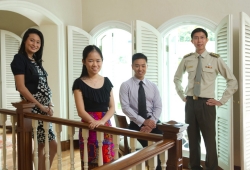4 candidates have been awarded the 2014 Lee Kuan Yew Scholarship.
PSC Scholarships: How Candidates are Assessed
Mr Eddie Teo, Chairman of PSC Has Written a Second Open Letter.
Mr Eddie Teo, Chairman of PSC has written a Second Open Letter

The Lee Kuan Yew Scholarship was set up in 1991 by the Tanjong Pagar Citizens’ Consultative Committee with funding from the public, to commemorate the contributions made by Mr Lee Kuan Yew to Singapore. This year, the scholarship has been awarded to four outstanding young people to pursue their post-graduate studies:
- Miss Abigail Sin Si Ern - pursuing a PhD in Performance Practice at the Royal Academy of Music, UK.
- Ms Charlene Chang E-Ching - pursuing a Master in Public Management at the Lee Kuan Yew School of Public Policy, Singapore.
- COL Goh Si Hou - pursuing a Master of Science in Management for Experienced Leaders at the Stanford University, USA.
- Mr Kwa Chin Soon - pursuing a Master of Engineering in Geotechnology at Massachusetts Institute of Technology, USA.
Applicants for the Lee Kuan Yew Scholarship must be Singapore citizens and have an outstanding track record of leadership and service within or beyond their profession. Lee Kuan Yew Scholarship holders can pursue postgraduate studies overseas or locally in various fields to develop their potential as leaders. There is no restriction on the course of study. The scholarship holders are expected to actively contribute towards the betterment of Singapore, Singaporeans and the community.
The Straits Times
24 September 2013
PSC Scholarships: How Candidates are Assessed
We thank Mr Devadas Krishnadas for his letter ("PSC scholarships: Tackle larger issues"; last Friday).
We agree that students from less privileged backgrounds should be helped. There are government bursaries and financial assistance schemes to help them get a good education and enhance their social mobility.
A Public Service Commission (PSC) scholarship has a different purpose. It is meant to help the Singapore Public Service get its fair share of talent.
As the scholarship is awarded based on merit, there are no quotas. What this means is that all deserving candidates, regardless of their family backgrounds, are awarded the scholarship.
In assessing applicants for scholarships, the PSC looks not just at their capabilities, but also their commitment and passion to serve Singapore and Singaporeans.
PSC scholarships are awarded only to Singaporeans. A permanent resident is required to take up Singapore citizenship before his award is confirmed.
Mr Devadas said a scholarship should provide only the benefit of education, and that career progression and access to development opportunities should be based on performance.
The Civil Service appraisal system rigorously assesses an officer's potential to do a bigger job as well as his performance in his current job.
Officers with good performance and potential are identified and groomed, regardless of whether they are scholarship holders or not.
This is why a good number of public service leaders, including permanent secretaries and chief executive officers of statutory boards, did not start off as scholarship holders.
Terence Chia
Director
Public Service Commission Secretariat
Chairman/PSC has written a second open letter which highlights the value of diversity in the Singapore Public Service. It describes how the PSC has sought diversity by selecting scholarship holders from a variety of schools and backgrounds and sending them to study in different courses and countries. It also elaborates on how the PSC guards against elitism and ensures that candidates are selected for scholarships based on a broad definition of merit.
The second open letter can be found here
Chairman/PSC has written a second open letter which highlights the value of diversity in the Singapore Public Service. It describes how the PSC has sought diversity by selecting scholarship holders from a variety of schools and backgrounds and sending them to study in different courses and countries. It also elaborates on how the PSC guards against elitism and ensures that candidates are selected for scholarships based on a broad definition of merit.
The second open letter can be found here.


